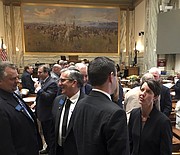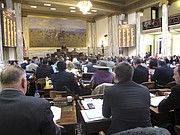No deal: Infrastructure negotiations collapse
HELENA — Dozens of Montana schools that were counting on state funding to replace crumbling roofs and old boilers are out of luck. The same goes for rural areas looking to upgrade their aging water systems and colleges and universities that planned to expand or renovate buildings on their campuses.
Montana lawmakers adjourned the 2017 legislative session Friday just like they did two years ago — failing to authorize bonds to pay for state infrastructure projects after negotiations collapsed and threats failed to sway intransigent legislators.
The Montana House tried twice to push through the $80 million package on Friday but came up three votes short each time of the two-thirds supermajority required to pass the bill.
In all, the House rejected versions of the infrastructure bill six times before giving up and voting to end the session. Besides the schools and water systems, the projects that won’t be funded include a veterans’ home in Butte that had been promised for nearly a decade and the Montana Historical Society’s plans to build top-notch museum and heritage center.
Gov. Steve Bullock, lawmakers and lobbyists had scrambled in a bid to secure votes for passage since Thursday, when the House last rejected the bill. A last-minute alternative plan that removed bonding from the bill was rejected by House Republican leaders moments before the floor votes.
“There were projects included in the infrastructure bill, and there were spending priorities that the Republican caucus didn’t feel reflected their priorities,” House Speaker Austin Knudsen said after the session. “The governor made it clear that his spending priorities were big state-owned projects that we didn’t feel were critical infrastructure.”
Democrats tried to pressure Republicans on the floor to vote for the bill by threatening to sink another bill that would have funded rural water projects that are favored by GOP lawmakers from those areas. Both bills ended up going down.
“We gave it everything we had,” said House Minority Leader Jenny Eck, D-Helena. “We tried to convince the other side to be there with us. At the end of the day, their leadership was pushing not to support it.”
Some conservative representatives rejected outright the idea of putting the state into debt for 20 years to pay for any type of infrastructure.
Others were fine with using bonds to pay for water, sewer and road projects, but they drew a line at using debt to construct buildings they labeled as projects aimed at representing the districts of specific lawmakers.
The building projects included $22 million in renovations for Montana State University’s Romney Hall, $10 million for the new veterans’ home in Butte, $5.4 million for a dental hygiene building at the Great Falls College of Technology and $5 million for a technology building addition at Montana State University-Billings.
Republican House leaders tried to wrest concessions from Bullock, a Democrat, in exchange for passing the bonding bill, such as guarantees that he would not veto anti-abortion legislation or a charter school bill. But Knudsen, the House speaker, said he and Bullock came to an impasse and that Democrats just weren’t willing to back off their pet projects.
Bullock said he made every effort to negotiate with Knudsen, and that the bill’s failure to pass is the fault of the House Republican leadership.
“It’s incomprehensible to me that we walk out of this session again without a general infrastructure bill,” Bullock said. “I’m disappointed that some legislators put partisan politics over Montana jobs and the strengths of our communities.”
A similar bonding bill with many of the same building projects also failed on the final day of the 2015 legislative session. Bullock vetoed a 2013 infrastructure bill that arrived at his desk after lawmakers had already adjourned.
Knudsen noted that the Legislature passed separate bills that paid cash for other infrastructure projects and authorized spending federal funds for road projects, totaling about $1 billion in what he called “essential infrastructure.”
Rep. Jim Keane, D-Butte, who sponsored the cash infrastructure bills, said those measures pass every session.
“The Republicans are spinning to you people the lamest excuse that’s out there,” Keane said. “Most of that money’s highway money. We get that all the time.”







